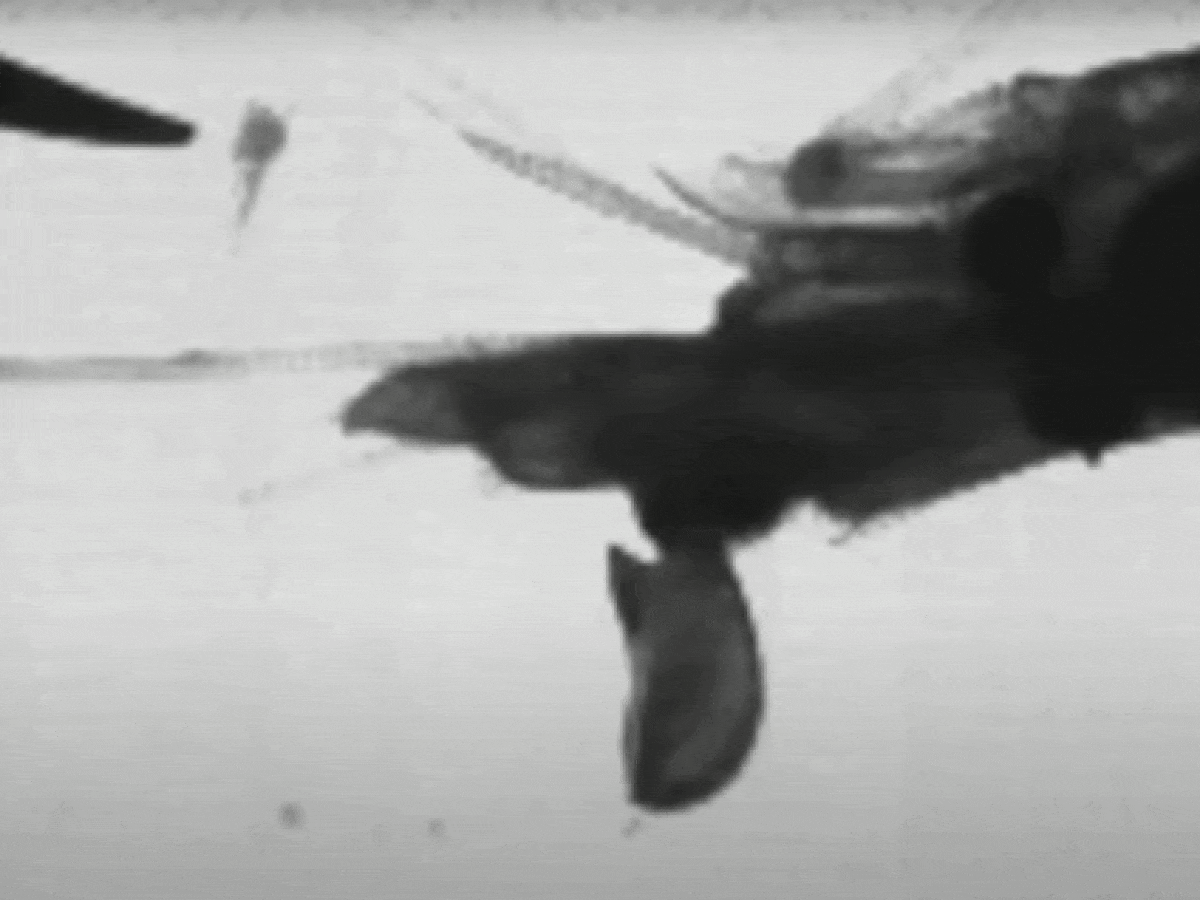Oceans
Historic Treaty Protects Marine Life in the 'High Seas'
The United Nations agreement will help conserve 30 percent of the planet’s oceans by 2030
How Lunar Cycles Guide the Spawning of Sea Creatures
Researchers are starting to understand the biological rhythms that sync worms and corals to phases of the moon
How Vacationers on Antarctic Cruises Are Filling in Scientific Gaps
From ships and submarines, citizen scientists can access remote areas ripe for new discoveries. But does the research make up for the climate impact?
Some Whales Use a Creaky 'Vocal Fry' Voice to Find Food
Like humans, toothed whales have three vocal registers: chest, falsetto and vocal fry
These Mythical Sea Monsters May Have Been Whales With Unusual Dining Habits
Tales of creatures like the Norse “hafgufa” suggest ancient and medieval people may have seen whales trap feeding
Florida’s Love-Hate Relationship With Phosphorus
The state has mined and abused the Devil's Element for decades, and now it is increasingly fouling precious coastal waters
These Young Shrimp Can Snap Their Claws as Fast as a Speeding Bullet
Juvenile snapping shrimp can achieve the fastest acceleration of any repeatable, underwater motion by a living thing, per a new study
Seaside California City Bans Balloons in Public
Laguna Beach has joined several other cities taking aim at ocean pollution, wildlife health, power outages and wildfires
See Rare Images of Early 20th-Century Antarctic Expeditions
For the first time, hundreds of photos, lantern slides and glass plate negatives are available to the public
These Tsunami Detectives Search for Ancient Disasters
The gigantic waves have been decimating coastlines since time immemorial. We ignore these prehistoric warnings at our own peril.
Mexico Bans Great White Shark-Related Tourism on Guadalupe Island
The government cited bad practices in the industry as a reason for the ban, which has sparked concerns for the local economy
Can Satellites Really Detect Whales From Space?
Distant identification of whales is improving rapidly, but finding the behemoth creatures is still surprisingly tricky
Medieval Pantry Stocked With Spices Found in 500-Year-Old Shipwreck
The vessel, called "Gribshunden," sank off the coast of Sweden in 1495
Iceberg Twice the Size of New York City Breaks off From Antarctica
The event was expected and not linked to climate change, researchers say
Oceans Break Record for Highest Temperatures Four Years in a Row
Warming oceans can drive sea-level rise and extreme weather
These Gorgeous Photos Capture Life Inside a Drop of Seawater
A passion for the infinitesimal leads a photographer to discover the countless creatures that live unseen in the ocean
Archaeologists Recover 275 Artifacts From Mysterious Arctic Shipwreck
Explorer John Franklin and his 128 crew members disappeared while searching for the Northwest Passage in the 1840s
How Animals May Have Conquered Snowball Earth
We know there were animals during our planet's chilliest era. But what did they look like?
Drones Spot Sharks That Wander Too Close to Busy Beaches
Ongoing tests show that the technology is an effective way to track the animals and monitor for threats
The Etymology of Unobtanium
The much-mocked wonder-rock from the 2009 blockbuster 'Avatar' doesn’t have an atomic number, but engineers have used the actual word for decades
:focal(750x514:751x515)/https://tf-cmsv2-smithsonianmag-media.s3.amazonaws.com/filer_public/91/51/9151fe17-3138-41ec-95c7-9ae69a644c62/ezgif-4-7ee9e85c9e.jpeg)
:focal(800x602:801x603)/https://tf-cmsv2-smithsonianmag-media.s3.amazonaws.com/filer_public/d2/8a/d28a9303-1b11-424c-8e06-a42087e62255/coral-spawning_web.jpg)
:focal(800x602:801x603)/https://tf-cmsv2-smithsonianmag-media.s3.amazonaws.com/filer_public/64/58/645809db-ca06-4a81-acfe-00ebb89facca/sgigantea_-_mark_niesink_1.jpg)
:focal(350x213:351x214)/https://tf-cmsv2-smithsonianmag-media.s3.amazonaws.com/filer_public/ae/04/ae04a32a-a5ce-4797-b730-871d16387c2b/low-res_mr_scan_of_porpoise_head_with_two_pairs_on_phonic_lipspng.jpg)
:focal(400x240:401x241)/https://tf-cmsv2-smithsonianmag-media.s3.amazonaws.com/filer_public/1a/fd/1afdedfc-46e4-4338-af46-1f08811efd5a/mysterious-new-behavio-1.jpg)
:focal(800x602:801x603)/https://tf-cmsv2-smithsonianmag-media.s3.amazonaws.com/filer_public/31/51/315180f3-5397-4839-a449-0555d2260806/gettyimages-546295504_web.jpg)

:focal(2736x1824:2737x1825)/https://tf-cmsv2-smithsonianmag-media.s3.amazonaws.com/filer_public/a5/37/a5377aed-dfb3-44bf-89dc-6c6fe63cfa32/pexels-this-is-zun-1680638.jpg)
:focal(1500x1114:1501x1115)/https://tf-cmsv2-smithsonianmag-media.s3.amazonaws.com/filer_public/8f/d4/8fd48c8d-e530-4521-87d4-081b2413efeb/25039650_0001.jpg)
:focal(800x602:801x603)/https://tf-cmsv2-smithsonianmag-media.s3.amazonaws.com/filer_public/ad/64/ad64be95-8dd6-4353-8507-eedc714fcb4f/header-uncropped_web.jpg)
:focal(1050x710:1051x711)/https://tf-cmsv2-smithsonianmag-media.s3.amazonaws.com/filer_public/4a/a0/4aa00d86-08d0-4dcc-bd94-1b3de4097ee8/gettyimages-612427002.jpg)
:focal(800x602:801x603)/https://tf-cmsv2-smithsonianmag-media.s3.amazonaws.com/filer_public/4c/c9/4cc912ba-32e1-42ba-ab62-9c91b5ab26eb/header-uncropped-whales-from-space_web.jpg)
:focal(1024x683:1025x684)/https://tf-cmsv2-smithsonianmag-media.s3.amazonaws.com/filer_public/10/62/106207e2-1fe4-40a8-93a1-f6edacdedaa2/50336026327_f79786972c_k.jpg)
:focal(768x461:769x462)/https://tf-cmsv2-smithsonianmag-media.s3.amazonaws.com/filer_public/8e/b8/8eb86292-6e1a-436a-920a-adef214bef4f/brunt-ice-shelf-chasm-1-a-1536x919.jpeg)
:focal(2675x1758:2676x1759)/https://tf-cmsv2-smithsonianmag-media.s3.amazonaws.com/filer_public/ab/35/ab359638-6072-4084-aeb9-c0d50855fa51/gettyimages-1392464830.jpg)
:focal(1600x1204:1601x1205)/https://tf-cmsv2-smithsonianmag-media.s3.amazonaws.com/filer_public/94/3c/943c7e9b-a806-4ffe-bc27-14e654dd2ae9/opener_-_smithsonian_seadrops_fitor-1.jpg)
:focal(1000x667:1001x668)/https://tf-cmsv2-smithsonianmag-media.s3.amazonaws.com/filer_public/53/a9/53a97478-6ef6-4c7a-a115-eaa554f23e98/fjjtfwsx0am71_c.jpeg)
:focal(800x602:801x603)/https://tf-cmsv2-smithsonianmag-media.s3.amazonaws.com/filer_public/92/c9/92c904d5-d115-47f7-b079-893222aa967f/header-uncropped_web.jpg)
:focal(1250x601:1251x602)/https://tf-cmsv2-smithsonianmag-media.s3.amazonaws.com/filer_public/a0/65/a065dbdd-ffd2-4cfe-a5aa-a1291505e992/header-shark-drones.jpg)
:focal(548x456:549x457)/https://tf-cmsv2-smithsonianmag-media.s3.amazonaws.com/filer_public/87/9b/879b66b5-ca65-41ed-bce0-43f12d103eee/ezgifcom-gif-maker.jpg)